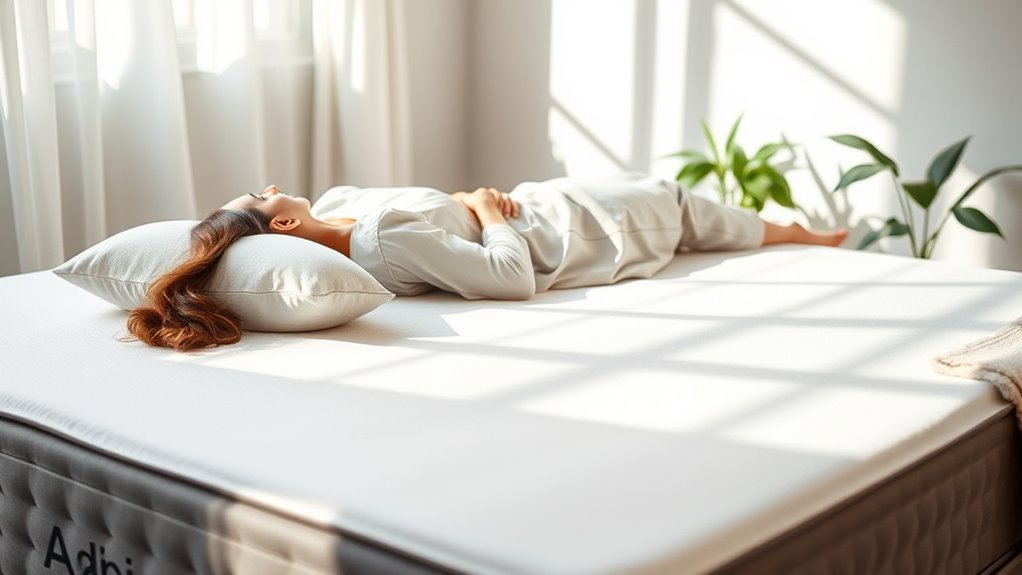To select a firm mattress for back sleepers with neck pain, focus on medium-firm options that support spinal alignment while alleviating pressure points. Look for high-density foam or latex materials that contour to your body without compromising firmness. It’s crucial to test various mattresses, spending 10-15 minutes lying down to assess comfort. Regular maintenance, like rotating your mattress, will enhance longevity. There are additional factors to take into account to guarantee you get the best night’s sleep.
Understanding the Needs of Back Sleepers
When considering the needs of back sleepers, it’s crucial to recognize how proper support affects spinal alignment and overall sleep quality. Back sleepers typically require a mattress that maintains a neutral spine position, minimizing strain on the lower back. This sleep position can lead to pressure points, particularly in the lumbar region, which may cause discomfort if not adequately supported. A mattress that contours to your body while offering firm support guarantees weight distribution is even, reducing the risk of developing pressure sores. Additionally, proper alignment decreases the likelihood of waking with pain or stiffness. By understanding these needs, you can select a mattress that enhances your sleep experience, promoting freedom from discomfort and fostering restorative rest.
Importance of Firmness for Spinal Alignment
For back sleepers, selecting the right firmness level is essential for maintaining ideal spinal alignment during sleep. A firm mattress supports your natural curvature, promoting spinal health and reducing the risk of discomfort. The right firmness helps distribute body weight evenly, ensuring adequate pressure relief on critical areas like the lower back.
| Firmness Level | Benefits | Considerations |
|---|---|---|
| Soft | Immediate comfort | May not support spinal alignment |
| Medium | Balanced support and comfort | Can vary based on body type |
| Firm | Optimal spinal alignment | May feel too hard for some |
Choosing a firm mattress can greatly enhance your sleep quality, providing the support needed for spinal health while alleviating neck pain.
Materials That Support Neck Pain Relief
Choosing the right materials in a mattress can greatly impact neck pain relief for back sleepers. Memory foam is often recommended due to its ability to contour to the natural curvature of your neck and head, providing targeted support. This material can alleviate pressure points, promoting spinal alignment vital for reducing neck discomfort. Alternatively, latex options offer a firmer feel while still conforming to your body, ensuring adequate support without excessive sinking. Both materials are breathable, which can enhance your overall sleep quality. When selecting a mattress, consider how these materials interact with your unique body shape and sleeping habits, as ideal neck support is essential for achieving restful sleep and minimizing pain.
Features to Look for in a Firm Mattress
When selecting a firm mattress, it’s essential to take into account the ideal firmness level and the types of supportive materials used. A mattress that’s too soft can compromise your spinal alignment, while the right firmness can enhance comfort and support. Additionally, materials like high-density foam or innerspring coils provide the necessary support for back sleepers.
Ideal Firmness Level
A preferable firmness level for a mattress considerably impacts the quality of sleep for back sleepers. Research indicates that a medium-firm mattress, typically rated between 5 to 7 on a 10-point scale, offers ideal support for spinal alignment. This firmness level accommodates the natural curvature of your spine, reducing pressure on sensitive areas. When evaluating mattress construction, consider the materials used, as they can affect firmness perception. A mattress that’s too soft may lead to misalignment, while one that’s excessively firm can create discomfort. Prioritizing the right firmness helps guarantee that your sleep positions maintain proper posture, ultimately alleviating neck pain. Choosing the ideal firmness empowers you to achieve restorative sleep and enhances overall well-being.
Supportive Material Types
While selecting a firm mattress, understanding the types of supportive materials is essential for ensuring adequate spinal alignment and comfort. Memory foam offers contouring properties that can alleviate pressure points, helping to maintain proper posture during sleep. It’s vital to choose a high-density option, as this provides the necessary support without excessive sinkage. On the other hand, latex support presents a firmer feel while still offering some flexibility. Natural latex is breathable and resilient, promoting a cooler sleep environment while maintaining consistent support. The combination of these materials can enhance your overall sleep quality, reducing neck pain and promoting spinal alignment. In your search, prioritize these supportive materials to achieve the balance between firmness and comfort that your body needs.
Testing and Choosing the Right Firmness Level
Choosing the right firmness level is vital for maintaining spinal alignment and overall comfort as a back sleeper. It’s essential to test various firmness options in-store, as personal preference plays a significant role in your experience. Your body’s response to different levels of firmness can help you identify the best choice for restful sleep.
Importance of Firmness
Firmness plays an essential role in ensuring ideal spinal alignment and support for back sleepers. When you sleep on your back, your mattress must provide adequate support to maintain the natural curvature of your spine. Different mattress types, such as memory foam, latex, or innerspring, offer varying firmness levels, affecting your sleep position and overall comfort. A firmer mattress prevents excessive sinking, which can lead to misalignment and exacerbate neck pain. Research indicates that a medium-firm to firm mattress is often recommended for back sleepers, as it balances comfort and support. By understanding these firmness characteristics, you can select a mattress that enhances your sleep quality while promoting spinal health and allowing you the freedom to wake up pain-free.
Try Before Buying
How can you guarantee that a mattress meets your specific firmness needs? The best approach is to visit mattress stores and test various options in person. During your visit, lie down on each mattress for at least 10-15 minutes, focusing on how your body feels in a back sleeping position. Pay attention to spinal alignment and any pressure points, especially around the neck and shoulders. Many mattress retailers offer a trial period, allowing you to sleep on the mattress at home before making a final decision. This period is essential for evaluating comfort and support in your own environment. Remember, firmness preferences can be subjective; personal testing is important for ensuring ideal sleep quality and reducing neck pain.
Maintenance Tips for Longevity and Comfort
Although a firm mattress can provide essential support for back sleepers, proper maintenance is crucial to guarantee its longevity and comfort. Implementing effective mattress care practices will enhance your sleep experience. Here are three key maintenance tips:
- Rotate Regularly: Every three to six months, rotate your mattress to prevent uneven wear and extend its lifespan.
- Use a Mattress Protector: A high-quality protector helps shield against spills, allergens, and dust mites, making cleaning easier.
- Clean with Care: Utilize appropriate cleaning techniques, such as spot cleaning with mild detergent and water, to maintain freshness without damaging materials.
Frequently Asked Questions
How Does Sleeping Position Affect Mattress Selection?
Your sleeping position plays an essential role in mattress selection. If you’re a back sleeper, you’ll need a mattress with adequate firmness to maintain proper sleep alignment, preventing strain on your neck and spine. A too-soft mattress can lead to misalignment, exacerbating discomfort. Conversely, a firmer mattress can provide the support you need, but it mustn’t be so rigid that it compromises your comfort. Finding that balance is vital for a restorative night’s sleep.
Can a Pillow Impact Neck Pain While Back Sleeping?
Yes, a pillow can greatly impact neck pain while back sleeping. The right pillow height helps maintain spinal alignment, reducing strain on your neck. Ideally, your pillow should support the natural curve of your neck without raising your head too high. Additionally, pillow material plays a role; memory foam or latex can provide better support and pressure relief compared to traditional options. Choosing the right combination can enhance comfort and alleviate discomfort.
What Is the Ideal Mattress Lifespan for Back Sleepers?
The ideal mattress lifespan for back sleepers typically ranges from 7 to 10 years. Over time, mattress durability decreases, impacting your sleep quality. A worn-out mattress may fail to provide the necessary support, potentially exacerbating neck pain. Regularly assess your mattress for signs of sagging or discomfort; if you notice these issues, it’s time to contemplate a replacement. Prioritizing a durable mattress can greatly enhance your overall sleep experience and well-being.
Are Adjustable Beds Suitable for Back Sleepers With Neck Pain?
Yes, adjustable beds can be suitable for back sleepers with neck pain. By using adjustable bases, you’re able to customize the elevation of your head and neck, which can enhance neck support and alleviate pressure points. Research indicates that the ability to adjust your sleeping position can lead to improved spinal alignment and reduced discomfort. This flexibility allows for a more personalized sleep experience, promoting better overall rest and potentially less pain.
How Often Should I Replace My Firm Mattress?
Replacing your firm mattress is like replacing a worn-out pair of shoes; it’s essential for comfort and support. Generally, you should consider a replacement every 7 to 10 years, depending on the mattress material and your personal needs. Over time, even the best mattresses can lose their ability to provide pain relief. Regularly evaluating your comfort can help guarantee you maintain the freedom to sleep soundly without discomfort or pain.



